Somewhere between 70 and 85 million people died in World War II, about 3% of the world’s population in 1940. The conflict reached across the globe, engaging all imaginable powers. Those on the battlefields fared badly, but famine, disease, brutality and oppression caused millions of civilian deaths. The Holocaust murdered millions of Jewish people, but also targeted millions from eastern Europe as well as Roma, LGBTQ+ people, and people with disabilities. Few countries escaped the touch of the war, and it has remained a huge part of our literary efforts for seven decades.
This list is a suggestion of World War II books suitable for book clubs. It’s a mix of fiction and nonfiction, and aims to consider some perspectives that are less well known. I’ve added possible book club questions for each one to help get the conversation going. There are so many books about World War II that nobody could read them all in a lifetime — and not all books are equal in this space.
Following author John Boyne’s tweeted assertion that there are now too many books with ‘Auschwitz’ in the title, the Auschwitz Museum responded to him, noting their work to expose inaccuracies in literature about the Holocaust — and adding that Boyne’s own book The Boy in the Striped Pyjamas “should be avoided by anyone who studies or teaches about the history of the Holocaust.”
When the book was published, Boyne was much lauded and celebrated, and the story was adapted into a successful film. In time, perhaps some of the books on this list will also be reevaluated and reconsidered in light of increased research and enhanced awareness of harmful tropes — but for now, I hope this list is a good place to start.
The Light Years by Elizabeth Jane Howard
The first of The Cazalet Chronicles, a series of five novels following the extensive Cazalet family from the fear of war breaking out, through the war itself and into the cultural change of the ’50s and ’60s in Britain. I’ve only recently discovered these and they’ve filled my heart to the brim, I recommend them to everyone.
Book Club Questions
- The Cazalets feel like real people who make complicated choices. Which characters did you most empathize with?
- Howard’s characters range in age from small children to elderly grandparents, all with different points of view. Did you like this style of storytelling?
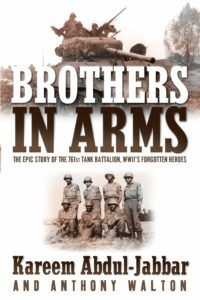
Brothers in Arms by Kareem Abdul-Jabbar and Anthony Walton
The 761st Tank Battalion was made up of mostly Black recruits, trained as part of a PR campaign to ensure the war was supported by the Black community. Though never intended to see battle, the battalion was called up in 1944. The men of the 761st served at the Battle of the Bulge and across the final push through France and Germany with quiet patriotism.
Book Club Questions
- Had you ever heard of the 761st before reading this book? How many other stories like this do you think there are, still unknown?
- The book’s title draws on the universal fraternity of battle as well as the deep connections between the members of the 761st. Did you like the title, or would you change it?
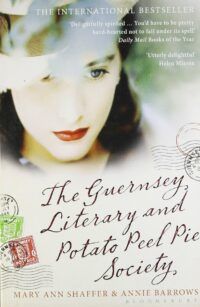
The Guernsey Literary and Potato Peel Pie Society by Mary Ann Shaffer and Annie Barrows
An epistolary noel, the story follows writer Juliet Ashton as she exchanges letters with the Guernsey Literary and Potato Peel Pie Society, a group who broke curfew during the Germany occupation. She travels to Guernsey to meet her newfound friends, a journey that changes her life for good. A massive bestseller and adapted into a film, this one is life-affirming.
Book Club Questions
- The book takes the form of letters going back and forth. Do you like this approach, or would you have preferred a different narrative style?
- Lots of residents share their memories with Juliet. Which voices did you find most memorable and why?
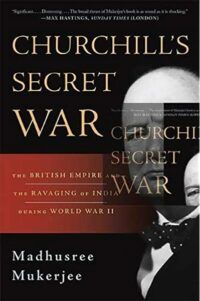
Churchill’s Secret War by Madhusree Mukerjee
People quote Churchill constantly as a statesman and war leader, but parts of his legacy are deeply troubling. While Churchill fought against the oppression of the Nazis, he crushed the spirit of India and was directly responsible for some three million Indian deaths. Revisiting his legacy is key to understanding the true weight of the British Empire in India.
Book Club Questions
- World War II was undoubtedly a global issue, but individual countries had very differing experiences of the war years. Did you know about the British Empire’s history in India?
- Churchill is broadly adored and admired. Do you think this book would change opinions of him, or does his victory in World War II obscure anything else?
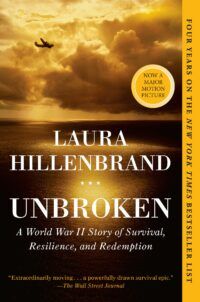
Unbroken by Laura Hillenbrand
Louis Zamperini competed at the 1936 Olympics. A powerful runner, he found himself fighting in World War II, crashing into the Pacific and surviving on a raft for over a month before being taken as a PoW by the Japanese. The book covers everything from his childhood to the years after the war — and his later return to Japan.
Book Club Questions
- Did you enjoy the opening section about Louis’s childhood and running? Did the intro help you to understand his later reactions and responses as a PoW?
- Did you learn anything new about the Pacific theatre during World War II from the book?

Alan Turing: The Enigma by Andrew Hodges
This covers the life of mathematician Alan Turing, who joined British Intelligence in 1938 and cracked ciphers during World War II. His theories about machines and computers were way beyond their time and Turing should have risen to the top of the world — but instead, a conviction based on his sexuality resulted in humiliation. Following his life from start to finish, this book looks beyond the battlefield and asks key questions about humanity.
Book Club Questions
- Much of modern computing is based on Turing’s scientific theories, but he never got to see an iPhone. What is Alan Turing’s impact on daily life today?
- Turing was deemed a danger to security as a result of his sexuality. Despite the passage of time, there remains a perception today that some groups of people are dangerous to society. How does this make you feel?
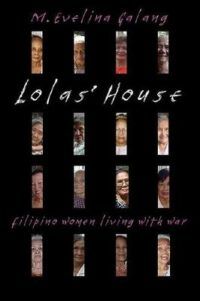
Lola’s House by M Elevlina Galang
The ‘comfort women’, forced into sexual slavery by the Imperial Japanese Army, are rarely discussed and not widely known. Lola’s House tells the tale of 16 of these women during their captivity in the Philippines. It’s a testimony and a protest, but it’s also a great read and taught me so much
Book club questions
- Did you know about ‘comfort women’ before you read Lola’s House?
- There are estimates that 50,000–200,000 women were forced into sexual slavery during the war. Why do you think ‘comfort women’ are a lesser known aspect of the war reality?
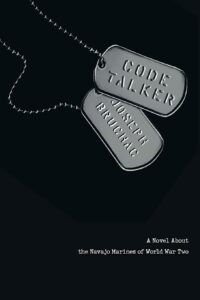
Code Talker by Joseph Bruchac
Navajo code talkers played a huge role in the U.S. war effort, exchanging messages in an unbreakable native code. Bruchac’s work is a fictional take, following 16-year-old Ned Begay into life as a code talker. Suitable for an adult audience as well as young adults, it’s a great look inside a slice of the war that’s unrewarded and vastly forgotten.
Book Club Questions
- Ned’s mission school has a motto: “Tradition is the enemy of progress”. Does this motto ring true today?
- What personal qualities of Ned’s did you appreciate most?
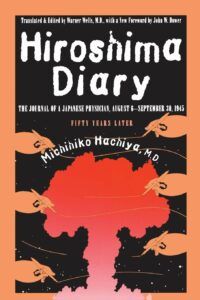
Hiroshima Diary by Michichiko Hachiya
Despite the heavy burden of his responsibility at the Hiroshima Communications Hospital, Dr Hachiya recorded what he saw daily after Hiroshima was bombed. Originally published in the 1950s, it remains a stark and enduring reminder of how World War II came to a close, and also gives insight into the cultural attitudes and in-built misogyny of the time.
Book Club Questions
- Dr Hachiya is factual in his reports. Did you like this approach?
- Did you sympathise with the fury and humiliation of the bombing victims and their cheer when they thought of revenge? Equally, when the surrender came, did you anticipate their anger toward the Emperor?
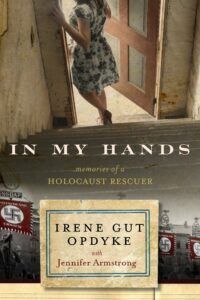
In My Hands by Irene Gut Opdyke
A first-person account of a Catholic nursing student in wartime Poland. Gut stole food from a hotel kitchen for people in the Tarnopol Ghetto, and eventually smuggled people out. Recruited as a housekeeper for a Nazi, she hid Jewish people in his cellar, and gave up almost everything to keep them safe. One of the Righteous Among the Nations, Gut Opdyke’s story is one of true courage and selflessness.
Book Club Questions
- Gut Opdyke leaves us with many questions. What was her marriage like? How did her sisters fare after the war? Did she ever see Rugemar again? What questions would you ask her?
- The author writes about a seemingly sudden onset of antisemitism in a town that had never seemed to make any distinction between people. Does her experience have any reflection in the present day?
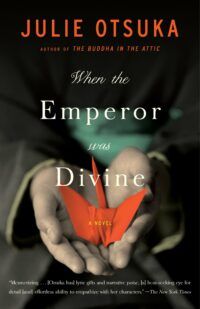
When the Emperor was Divine by Julie Otsuka
This is a fictional retelling of the Japanese American experience during internment, inspired by the author’s mother’s experiences. Readers follow the story of a nameless family in sections: Mother, Daughter, Son, Daughter and Son, Father. The family relay their preparations, transport, life in the camp and the return home. To me, the final chapter is the reason this book is so good.
Book Club Questions
- Of the five characters, which one do you most relate to? Did not giving them names enhance the universalism, or prevent you getting to know them better?
- Though the family eventually reunite, there is a ghost among them. The final chapter is titled ‘Confession’. Do you agree with that title?
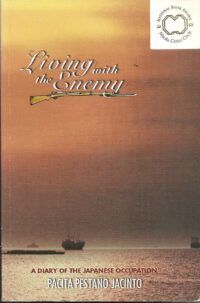
Living With the Enemy by Pacita Pestaño-Jacinto
The author was just married and pregnant, enjoying her independence in Manila, when the United Stated entered World War II in December 1941. This book is made up of her diaries over three years of occupation, caught between the injustices of the Imperial Japanese Army, and the imperfect alliances with the Americans. It’s hard to buy a copy of this, but it’s worth a library search.
Book Club Questions
- The author’s reflections paint her as a middle class, relatively well-to-do person in the Manila of 1941. How would her story have been different if she had been less privileged?
- The author writes about the Bataan Death March, with estimated death figures between 5,500 and 18,000. Prisoners were marched between 60 and 70 miles subjected to severe abuse. Had you known about the event before reading these diaries?
Even more great WWII reads:
- 100 Must-Read World War II Books
- 8 Stories of Unsung Heroes of World War II











